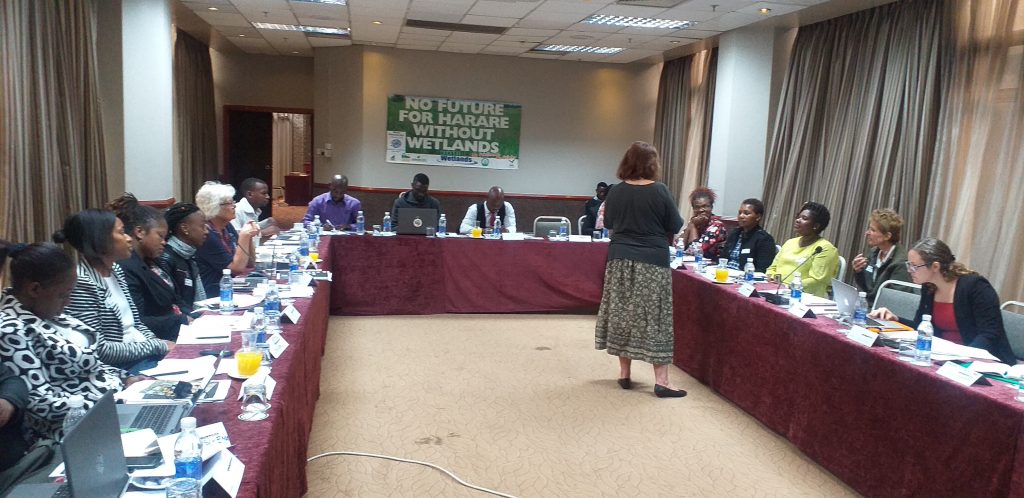Parliament Will Sit This Week, Starting Today, 10th December
This bulletin outlines the programme for this week’s sittings. First, however, is a paragraph that had to be omitted from Bill Watch 67/2019 of 6th December [link] to avoid undue length.
Non-Adverse PLC Reports on Bills Announced Last Week
On 3rd and 5th December the Speaker announced receipt of non-adverse reports by the Parliamentary Legal Committee [PLC] on the following Bills:
3rd December
Freedom of Information Bill
Marriages Bill
International Treaties Bill
5th December
Reserve Bank of Zimbabwe Amendment Bill
Veterans of the Liberation Struggle Bill
Constitutional Court Bill.
Coming up In the National Assembly
Fast-tracking
In the National Assembly fast-track procedure will continue to apply to:
- what is left for it to do on the Money Laundering and Proceeds of Crime Amendment Bill and Coroner’s Office Bill [see below]; and
- the completion of the ongoing Budget Debate, to consideration of the Estimates of Expenditure and to the passing of the related Finance (No. 3) Bill and the Appropriation (2020) Bill.
The resolution authorising fast-track procedure was approved by the National Assembly on 28th November. So far, however, no late-night [after 7 pm] sittings or Friday sittings have been considered necessary; this week may be different.
Budget Business
Both the Finance (No. 3) Bill [link] and the Appropriation (2020) Bill [link] were gazetted on Friday 6th December and are available for downloading on the Veritas website. Depending on progress made in the Budget debate and on the Estimates of Expenditure, the National Assembly could finish both Bills this week.
Continuation of the Budget Debate is listed as item 2 on the National Assembly Order Paper for 10th November. This is the opportunity for individual MPs to make their contributions to the debate; the first few MPs did so on 5th December, following the presentation of reports from all Portfolio Committees. At the end of the debate, the Minister of Finance and Economic Development will reply to points made by the committees and MPs. The House will then vote on the Minister’s Budget motion seeking permission to introduce the Finance (No. 3) Bill.
Next, as item 3, comes consideration of the Estimates of Expenditure, for which the whole House will as sit as a committee called the Committee of Supply. Each vote will be considered in turn. If the Estimates are approved, the Appropriation (2020) Bill will be introduced by the Minister. If MPs insist on amendments to the Estimates, corresponding amendments will have to be made to this Bill during the Committee Stage.
Bills
Coroner’s Office Bill
This Bill was amended during the Committee Stage on Thursday 5th December. The amendments were referred to the PLC for its report on their constitutionality. As the fast-track procedure is applicable, a prompt report is expected from the PLC today. The Bill, therefore, has a good chance of reaching the Senate in time to be dealt with this week.
Note: The amendments were not extensive. Only clauses 7 and 14 of the Bill were affected. The effect of the amendments is to provide for up to three family members of a deceased (or their representatives) to inspect the scene of death; to allow the family members to choose a medical practitioner to represent them at a post-mortem; and to impose a three-month time-limit on the publication of inquest findings. An annotated version of the Bill showing the amendments is available on the Veritas website [link].
Money Laundering and Proceeds of Crime Amendment Bill
Assuming a non-adverse report on the amendment made last week by the Senate see [Bill Watch 67/2019 [link]] and a Third Reading by Senators of the Bill as thus amended, this Bill will come back to the National Assembly for final approval. If this approval is given, the Bill will have been passed by Parliament and can then be sent to the President for assent and gazetting as law.
Freedom of Information Bill [link]
On 5th December, on the strength of the PLC’s non-adverse report on the Bill [see above], the Minister of Justice, Legal and Parliamentary Affairs started the Second Reading stage of this Bill by outlining its purpose. The House then adjourned for the weekend. Continuation of this stage depends on presentation of the Portfolio Committee report on the Bill by the committee chairperson, who was not available at the time. Unlike the Coroner’s Office Bill, this Bill was not mentioned in the fast-tracking resolution approved by the National Assembly on 28th November.
Other Bills listed for commencement of Second Reading Stage
Marriages Bill
International Treaties Bill
Veterans of the Liberation Struggle Bill
Constitutional Court Bill
Reserve Bank of Zimbabwe Amendment Bill.
Privileges Committee Report on MPs Allegedly Soliciting Bribes
Item 1 on the Order Paper is the adjourned debate Senator Chief Charumbira’s take-note motion of 4th December on the report of the Privileges Committee he chaired into allegations that four MPs on the Mines Portfolio Committee had solicited a bribe from a company seeking mining rights; see Bill Watch 67/2019 for details summarised the report’s findings [insufficient evidence to prove breach of privilege or contempt of Parliament] and recommended disciplinary action for conduct creating an impression of impropriety. If, however, MPs consider it more important to get on with Budget business and Bills than with this motion, they may choose to do so.
Coming up in the Senate
Bills
There are no Bills on the Senate’s Order Paper for today. Senators are waiting for Bills to be transmitted from the National Assembly.
Coroner’s Office Bill [link]
As mentioned above, this slightly amended Bill is nearing the end of its passage through the National Assembly, and is likely to reach the Senate today or tomorrow.
The two Budget Bills
Depending on progress made by the National Assembly, the Finance (No. 3) Bill [link] and the Appropriation (2020) Bill [link] could reach the Senate this week.
Freedom of Information Bill [link]
This Bill is the least likely to reach the Senate this week.
Motions
While waiting for Bills to come up from the National Assembly, Senators will continue with adjourned debates on the motion in reply to the Presidential Speech of 1st November at the opening of the present Parliamentary session [the State of the Nation Address]; the report of the delegation to the Pan-African Parliament High Level Summit on HIV and Health Financing in Africa [July 2019]; the report of the Thematic Committee on Gender and Development on the plight of people with disabilities, and challenges faced by women and girls with disabilities in Zimbabwe; and the motion calling for unconditional and immediate removal of the illegal economic sanctions imposed on Zimbabwe.
Bills Awaiting PLC Reports
Having submitted non-adverse reports on several Bills in the last ten days – see above and in Bill Watch 67/2019 [link] – the PLC has only two outstanding reports to deliver to the National Assembly, on the Amendments to the Coroner’s Office Bill [link] and on the Zimbabwe Media Commission Bill, which has been with them since its First Reading on 12th November.
Forest Amendment Bill Just Gazetted
The Forest Amendment Bill, HB 16, 2019 [link] was gazetted on Friday 6th December. It proposes introducing mandatory prison sentences for lighting fires in State or private forests, and increasing penalties for other offences designated “major offences” by the Forest Act; there are other measures also, for instance, to decentralise to forestry and environmental officers such matters as the adequacy of fireguards. The Bill also includes provisions designed to ensure the Forestry Commission Board includes persons with special qualifications in forestry, environmental planning and management and ecology and that its membership and the staffing of the Commission is gender-balanced. At first glance, the Bill appears to be marred by unacceptably vague, general and ungrammatical language.
Veritas makes every effort to ensure reliable information, but cannot take legal responsibility for information supplied.
Post published in: Featured

 Kathryn Rubino is a Senior Editor at Above the Law, and host of The Jabot podcast. AtL tipsters are the best, so please connect with her. Feel free to email her with any tips, questions, or comments and follow her on Twitter (@Kathryn1).
Kathryn Rubino is a Senior Editor at Above the Law, and host of The Jabot podcast. AtL tipsters are the best, so please connect with her. Feel free to email her with any tips, questions, or comments and follow her on Twitter (@Kathryn1).












 Jordan Rothman is a partner of
Jordan Rothman is a partner of 




